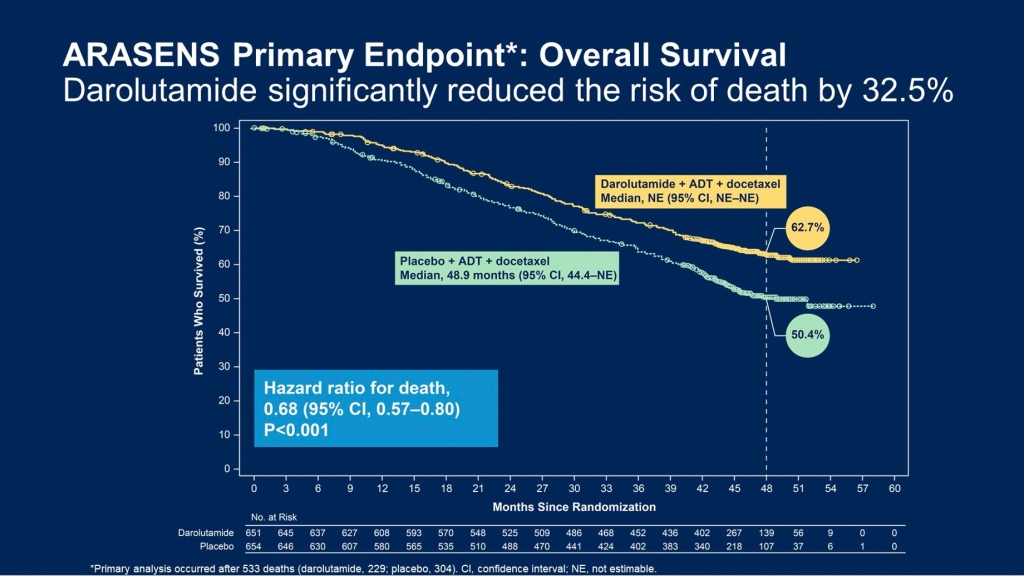To view this post on my blog site, sign up for future posts, and search for other posts on a variety of topics, please click here.
This week brought excellent and exciting news from the ASCO GU Meeting about management of high risk prostate cancer using “triple therapy” for metastatic disease. Adding further evidence for the “kitchen sink” approach, Matt Smith from MGH presented data from the ARASENS trial. The study involved 1306 patients with metastatic prostate cancer (86% of whom presented with metastases and the remainder of whom developed mets while being followed after primary treatment). The trial evaluated whether adding the potent anti-androgen, darolutamide aka Nubeqa® (similar to enzalutamide and apalutamide) to standard ADT (e.g. orchiectomy, leuprolide, or other GnRH analog) plus docetaxel (Taxotere®) could improve survival. We already knew that 6 cycles of docetaxel added to ADT in this situation improved survival from the CHAARTED trial I wrote a blog about several years ago. This was the trial design:

The results of the trial were very positive and represent a new “standard of care” for patients with metastatic prostate cancer:

Although it is too early to say whether some of the patients in this or similar trials, such as PEACE 1, have been cured, it is clear that throwing the “kitchen sink” at prostate cancer can offer real improvement in survival. Now the questions become: Who are the patients most likely to benefit? What kind of toxicities do these patients have to put up with? How much does this kind of treatment cost? What if we added other known effective treatments like Lu-177-PSMA or PARP inhibitors to appropriately selected patients? Would adding this kind of treatment cure some patients with oligometastatic disease? And perhaps most intriguing, could we imagine applying this kind of treatment to patients with newly diagnosed, localized (but high risk …e.g. Gleason 8,9,10, or node positive) disease as part of a plan that involved prostate surgery or radiation?
The answer to all of these questions will come only from appropriately designed clinical trials. I am reminded, too, of the famous quote from one of the pioneers in prostate cancer treatment, Dr. Willit Whitmore who said, “Is cure possible? Is cure necessary? Is cure possible only when it is not necessary?” There are obvious differences between the 52 year old man who presents with high risk prostate cancer and is otherwise healthy versus a 79 year old gentleman who had prostate surgery 15 years ago, a pacemaker, and now has a rising PSA with only one or two metastases showing up on a PSMA-PET scan.
The progress in prostate cancer research has accelerated dramatically during my career. As well, the costs of oncologic care are rising at a faster rate than can be maintained, “National costs for cancer care were estimated to be $190.2 billion in 2015 and $208.9 billion in 2020 (2020 U.S. dollars), an increase of 10 percent that is only due to the aging and growth of the U.S. population… National oral prescription drug costs were highest for female breast, leukemia, lung, and prostate cancers” (See this reference) As an aging (rapidly…) man myself, I can only hope we are able to fall back on the precepts taught in Sir William Osler’s essay, “Aequanimitas“, combining the qualities of “imperturbability” and “equanimity” to achieve “”coolness and presence of mind under all circumstances”. If so, we should be able to navigate the avalanche of medical knowledge and associated costs with compassion, empathy, and wisdom. Meanwhile, hats off to the researchers and men who participated in clinical trials and brought this advance and many others you can see here to fruition.




Hi Dr G
We talked about chemo early on in our discussions but not recently, I know I indicated I likely would not want to go that route, absent any hard evidence it would really help me with intraductal prostate cancer
– do you think we should revisit chemo?
– and continue on the LU177 track?
– I’m interested that Provenge was not mentioned in this “kitchen” of remedies
Regards
Bob